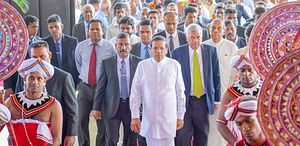Many Sri Lanka watchers have been talking about a recent interview with Chandrika Kumaratunga, who previously served as president of Sri Lanka and is currently the chairperson of the Office for National Unity and Reconciliation (ONUR).
The interview with Kumaratunga is worth reading in its entirely, although one part in particular has really caught people’s attention. Journalist Upal Wickramasinghe asked Kumaratunga where the country stands in terms of establishing national reconciliation.
“It is successfully carried out,” Kumaratunga notes. “In the face of opposition and a handful of extremists, activities are continuing with the blessings of the majority. Reconciliation means a lengthy activity. What is urgent now is to bring in a new constitution, and then comes the establishment of the Office of the Missing Persons. With these in place, there would not be any necessity to have courts to probe war crimes.”
This is an incredible statement for a variety of reasons; let’s look at a few of them. Kumaratunga’s assertion that reconciliation “is successfully carried out” is ludicrous, as the roots causes of Sri Lanka’s civil war – which was fought from 1983 to 2009 between Sri Lankan government forces and the separatist Tamil Tigers – remain unresolved. More specifically, Kumaratunga’s claim that “there would not be any necessity to have courts to probe war crimes” is rather remarkable. If that indeed is her position (and there’s no reason to believe she wasn’t being straightforward in the interview), then is her chairpersonship of ONUR even appropriate?
As I wrote in a recent Diplomat article, accountability for wartime abuses is a complicated and difficult issue – not least because Sri Lanka’s military is almost exclusively Sinhalese, the ethnic majority in Sri Lanka. Essentially many Sinhalese people revere the military for winning a brutal civil war; they wouldn’t want to see criminal prosecutions of military personnel. Nevertheless, in order to ensure lasting peace, a credible accountability process is a vital part of that endeavor. There’s no getting around that.
Additionally, it’s unsurprising that Kumaratunga has cited the country’s constitution-building project. It’s less controversial than transitional justice in general and accountability specifically. But even negotiations pertaining to a new constitution haven’t been going well recently. Besides, the coalition government and its acolytes should not be allowed to champion constitution-building as a defense for failing to pursue other aspects of the reform agenda.
None of Sri Lanka’s four proposed transitional justice mechanisms (a truth commission, a judicial mechanism, and offices to handle reparations and disappearances) are operational. Parliament has approved the creation of an Office of Missing Persons, but that’s it. And there’s no clear timeline for the establishment of an accountability mechanism.
At this point, it would be fair to wonder whether there will be any sort of accountability process at all, and to reconsider how much of the broader transitional justice agenda this government is serious about implementing. With Kumaratunga’s recent remarks, we could assume that she was speaking in a personal capacity. Unfortunately, her thoughts on reconciliation and accountability may not differ much from those of President Maithripala Sirisena or Prime Minister Ranil Wickremesinghe.

































